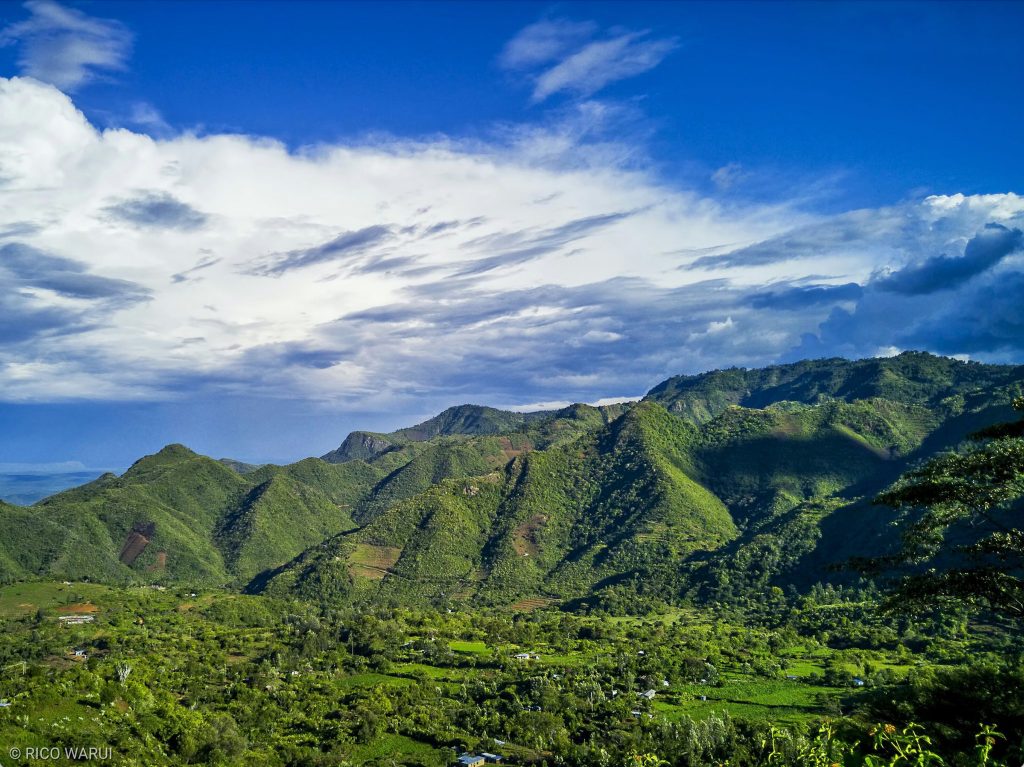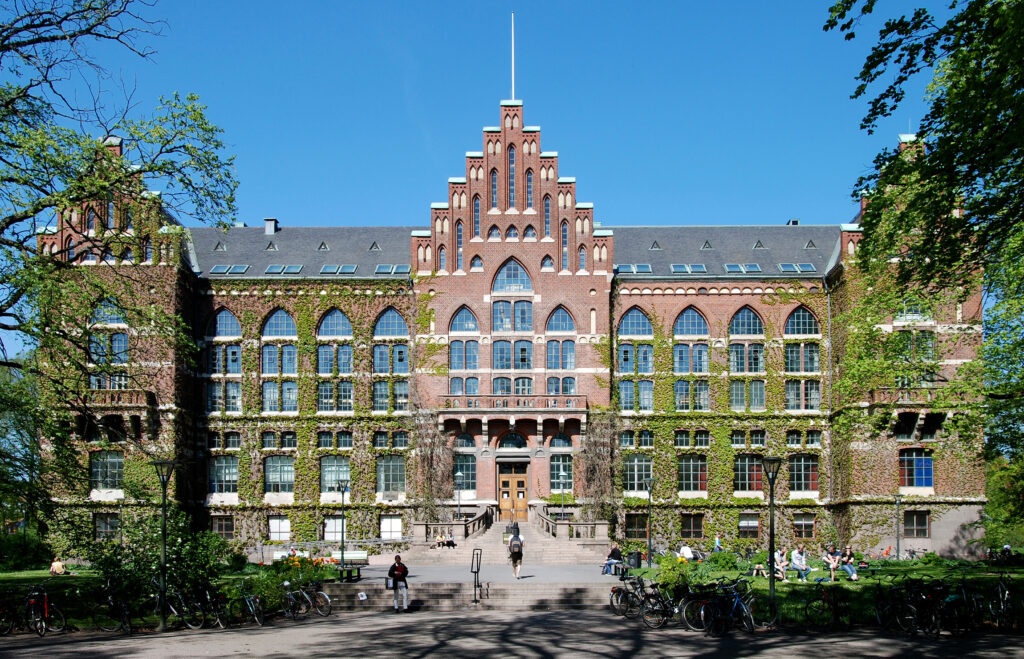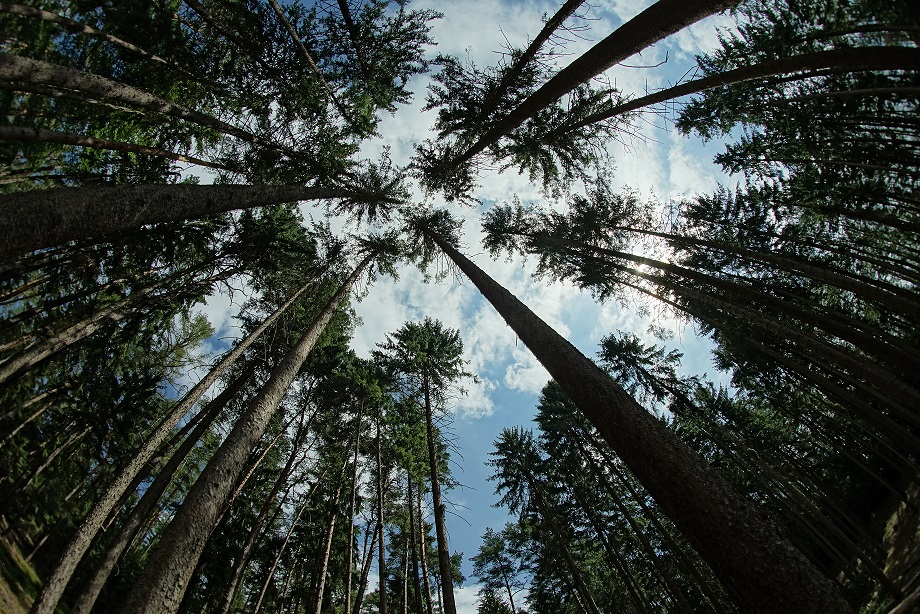Pathways to Sustainable Welfare critically examines how cities can address the dual challenges of climate change and sustainability while ensuring the welfare of their populations. Focused on three Swedish cities, it explores the integration of environmental and welfare concerns in local policies, urban movements and public opinions.
Next Coffee Talk with Dr. Léa Lacan: “Forest Politics in Kenya’s Tugen Hills: Conservation Beyond Natural Resources in the Katimok Forest” | 26. February 2025

26. February
2025, 6 am MST (North America) / 2 pm CET (Germany) / 3 pm EET (Finland)
Title: “Forest Politics in Kenya’s Tugen Hills: Conservation Beyond Natural Resources in the Katimok Forest”
Authors: Dr. Léa Lacan (Postdoctoral Researcher, University of Cologne, Germany)
Abstract:
Speaking from her recently published book of the same name, environmental anthropologist Léa Lacan will explore human-sylvan relations in the Katimok forest, Baringo highlands, Kenya, and aims to rethink the forest beyond questions of access and control of natural resources, as a habitat where forest politics and human lives are inextricably intertwined. Léa’s research shows, how – as with many forests in Africa – it has become constructed as a category and territory of nature under state control: an area both to be protected and turned into exploitable resources. For those living within and on the boundaries of the forest, this social-ecological transformation has had a significant impact. Despite now being settled outside Katimok itself, dispossessed by administrators heedless of local management practices, many former residents continue to maintain a close connection with the forest, not only to sustain their livelihoods, but also to maintain their intimate links with ancestral lands, where their stories and memories are materially inscribed and powerfully invoked.
To join the event, please use the Zoom Link: https://uni-jena-de.zoom-x.de/j/65854920539
Meeting-ID: 658 5492 0539; Kenncode: 008070
Coffee Talks Human-Forest-Relationships
Let’s sit, have a coffee and talk in the scientific café! The “Coffee Talks HFR” give room for open and relaxed discussions on current research subjects related to human and society relations to forests. It warmly welcomes all interested in forest-related research to join the online sessions.
Each session lasts 1,5 hours. It starts with a 20-30 minute presentation of a guest speaker. After the presentation, with coffee or tea at hand, participants have plenty of room for an open discussion and exchange.
The “Coffee Talks HFR” take place three to four times per term on Wednesdays at 6 am MST / 2pm CET / 3pm EET.
Guest speakers wanted!
If you are interested in contributing to the “Coffee Talks HFR”, please contact either jana.holz(at)uni-jena.de, jodie.asselin(at)uleth.ca or tuulikki.halla(at)uef.fi with info on your subject (title and short abstract) and a preferred date.
The interdisciplinary and international scientific “Coffee Talks HFR” have a long tradition. In 2021, a cooperation between the Finnish research project Human-Forest Relationships in Societal Change and the German research group Mentalities im Flux (flumen) launched and hosted the “Scientific Coffee Sessions HFR”. Since then, they hosted more than twelve sessions with speakers form interdisciplinary social science background and international participants. In 2024, the network broadened and the event got a new name: “Coffee Talks HFR”.
The “Coffee Talks HFR” are hosted by:
- Human-Forest Relationship Research Club of the Finnish Society of Forest Science
- The research group “Mentalities in Flux” (flumen) Research Project
- Forest Anthropology Working Group on Europe and Beyond (FORAGE) FORAGE – WUR
- Soz-Wald, a newly-established German speaking network of sociological research on forest relations. Info on the network’s first event: https://www.flumen.uni-jena.de/symposium-zur-soziologischen-waldforschung-am-01-dezember-2023-in-jena/; join our Email-list: https://www.listserv.dfn.de/sympa/info/soz-wald
Dr. John Björkman (University of Turku, Finland): “The Black Man of Villavuori sits in that forest, guarding the village border.” Sacred forest sites of folk belief in Southwest Finnish village landscapes | 22 January 2025

22. January 2025, 6 am MST (North America) / 2 pm CET (Germany) / 3 pm EET (Finland)
Title: „The Black Man of Villavuori sits in that forest, guarding the village border.“ Sacred forest sites of folk belief in Southwest Finnish village landscapes.
Authors: Dr. John Björkman (University of Turku, Finland)
Abstract:
In his doctoral thesis in Nordic Folkloristics, John Björkman studied natural places which were considered sacred, meaning magical, supernaturally dangerous or inhabited by supernatural beings in 19th century folk belief in Southwest Finland. Based on recorded historic folklore, Björkman was able to identify and localize 120 such places in the region of Southwest Finland and studied them as part of their contemporary village landscapes. Currently, he works in a research project exploring the transformation of the Finnish ritual forest relationship from prehistoric to modern times by combining the methods of archaeology, folklore, geoinformatics and art. The aim of the project is to increase understanding of the forest relationship and the importance of the experience of sacredness for the forest relationship.
To join the event, please use the Zoom Link: https://uni-jena-de.zoom-x.de/j/65854920539
Meeting-ID: 658 5492 0539; Kenncode: 008070
Coffee Talks Human-Forest-Relationships
Let’s sit, have a coffee and talk in the scientific café! The “Coffee Talks HFR” give room for open and relaxed discussions on current research subjects related to human and society relations to forests. It warmly welcomes all interested in forest-related research to join the online sessions.
Each session lasts 1,5 hours. It starts with a 20-30 minute presentation of a guest speaker. After the presentation, with coffee or tea at hand, participants have plenty of room for an open discussion and exchange.
The “Coffee Talks HFR” take place three to four times per term on Wednesdays at 6 am MST / 2pm CET / 3pm EET.
Guest speakers wanted!
If you are interested in contributing to the “Coffee Talks HFR”, please contact either jana.holz(at)uni-jena.de, jodie.asselin(at)uleth.ca or tuulikki.halla(at)uef.fi with info on your subject (title and short abstract) and a preferred date.
The interdisciplinary and international scientific “Coffee Talks HFR” have a long tradition. In 2021, a cooperation between the Finnish research project Human-Forest Relationships in Societal Change and the German research group Mentalities im Flux (flumen) launched and hosted the “Scientific Coffee Sessions HFR”. Since then, they hosted more than twelve sessions with speakers form interdisciplinary social science background and international participants. In 2024, the network broadened and the event got a new name: “Coffee Talks HFR”.
The “Coffee Talks HFR” are hosted by:
- Human-Forest Relationship Research Club of the Finnish Society of Forest Science
- The research group “Mentalities in Flux” (flumen) Research Project
- Forest Anthropology Working Group on Europe and Beyond (FORAGE) FORAGE – WUR
- Soz-Wald, a newly-established German speaking network of sociological research on forest relations. Info on the network’s first event: https://www.flumen.uni-jena.de/symposium-zur-soziologischen-waldforschung-am-01-dezember-2023-in-jena/; join our Email-list: https://www.listserv.dfn.de/sympa/info/soz-wald
New publication by Linda von Faber, Martin Fritz and Dennis Eversberg: “Mentalities in the energy and heat transition: A comparative study of German bioenergy villages.”
Together with Dr Martin Fritz and Dennis Eversberg, Linda von Faber has published the article “Mentalities in the energy and heat transition: A comparative study of German bioenergy villages.”
Abstract
Bioenergy villages (BED) cover a large part of their electricity and heat requirements with locally produced biomass. Particularly in the initial phase of their promotion around 20 years ago, there were hopes that a locally self-sufficient, decentralised and grassroots energy and heating transition could develop from this. The article analyses data from a Germany-wide representative survey and a postal survey of randomly selected BED residents across Germany in order to systematically 1) compare the social structure of BED with the cross-section of German villages and the overall German population for the first time, 2) determine the prevalence of types of socio-ecological mentalities in these three groups and 3) examine the attitudes of BED residents towards the transition process in their village and towards the energy and heating transition. The results show a combination of eco-social and conservative mentalities in BED, which offers potential for broadly supported local energy transition projects. However, more political support is needed for an expansion to other villages, as the conservative mentalities in rural areas are dominated by economic-calculative elements and the eco-social motivation is lower.
Article: Click here
Network Sociological Forest Research in the taz | 10 December 2024
An article has been published on the science page of taz.die tageszeitung that introduces the Sociological Forest Research Network and places it in the context of current challenges in forest management and the social science approach to it. Flumen employee Jana Holz launched the network in 2023 with the first sociological forest symposium in Jena in cooperation with Anna Saave (University of Freiburg), Ronja Schröder (formerly University of Oldenburg) and Ronja Mikoleit (FVA Freiburg). The online mailing list now includes over 100 people and the third symposium is already being planned for 2025.
Dr. Jodie Asselin (University of Lethbridge) and Dr. Agata Konczal (Wageningen University): “Exploring the Green Frontier: Patterns of Inequality in Europe’s Recent Forest Initiatives” | 13 Nov 2024

13 Nov 2024, 6 am MST (North America) / 2 pm CET (Germany) / 3 pm EET (Finland)
Title: Exploring the Green Frontier: Patterns of Inequality in Europe’s Recent Forest Initiatives
Authors: Dr. Jodie Asselin (University of Lethbridge, Canada) and Dr. Agata Konczal (Wageningen University, Netherlands)
Abstract:
In recent decades, there has been a global consensus on the urgent need for coordinated efforts to combat forest loss and degradation, given forests’ critical roles in climate change mitigation, biodiversity, and local economies. However, the development and implementation of forest policies are complex and politically charged, often addressing ‘wicked’ problems with diverse actors and conflicting values. The proposed solutions—such as conservation, rewilding, certification, and forest expansion—introduce their own challenges. This paper introduces the concept of ‘green frontiers’ as a lens to better understand patterns and consequences of this new forest dynamic in Europe. Applying critical perspectives typically used for frontier studies in the Global South to the Global North, this paper addresses a gap in literature on frontier-making in Europe while highlighting how environmental discourses are reshaping landscapes and communities, often reflecting historical patterns of dispossession and exploitation.
To join the event, please use the Zoom Link: https://uni-jena-de.zoom-x.de/j/65854920539
Meeting-ID: 658 5492 0539; Kenncode: 008070
This event is part of the Coffee Talks Human-Forest-Relationships
Coffee Talks Human-Forest-Relationships
Let’s sit, have a coffee and talk in the scientific café! The “Coffee Talks HFR” give room for open and relaxed discussions on current research subjects related to human and society relations to forests. It warmly welcomes all interested in forest-related research to join the online sessions.
Each session lasts 1,5 hours. It starts with a 20-30 minute presentation of a guest speaker. After the presentation, with coffee or tea at hand, participants have plenty of room for an open discussion and exchange.
The “Coffee Talks HFR” take place three to four times per term on Wednesdays at 6 am MST / 2pm CET / 3pm EET.
Guest speakers wanted!
If you are interested in contributing to the “Coffee Talks HFR”, please contact either jana.holz(at)uni-jena.de, jodie.asselin(at)uleth.ca or tuulikki.halla(at)uef.fi with info on your subject (title and short abstract) and a preferred date.
The interdisciplinary and international scientific “Coffee Talks HFR” have a long tradition. In 2021, a cooperation between the Finnish research project Human-Forest Relationships in Societal Change and the German research group Mentalities im Flux (flumen) launched and hosted the “Scientific Coffee Sessions HFR”. Since then, they hosted more than twelve sessions with speakers form interdisciplinary social science background and international participants. In 2024, the network broadened and the event got a new name: “Coffee Talks HFR”.
The “Coffee Talks HFR” are hosted by:
- Human-Forest Relationship Research Club of the Finnish Society of Forest Science
- The research group “Mentalities in Flux” (flumen) Research Project
- Forest Anthropology Working Group on Europe and Beyond (FORAGE) FORAGE – WUR
- Soz-Wald, a newly-established German speaking network of sociological research on forest relations. Info on the network’s first event: https://www.flumen.uni-jena.de/symposium-zur-soziologischen-waldforschung-am-01-dezember-2023-in-jena/; join our Email-list: https://www.listserv.dfn.de/sympa/info/soz-wald
Martin Fritz on research visit at Lund University, Sweden | 7-17 October, 2024

Flumen’s project manager, Martin Fritz, is visiting colleagues at Lund University in Sweden from October 7 to 17, 2024. Besides talking about the research results of flumen and ideas on co-operation, the current projects of the Swedish colleagues “Regulating the Polluter Elite: Exploring policy measures limiting carbon footprints of the rich” and “Economic Elites in the Climate Change Transformation: Practices, justifications and regulations of unsustainable lifestyles in Sweden” will also be the subject of the exchange and collaboration.
Research Report by Dennis Eversberg, Martin Fritz, Linda von Faber, Matthias Schmelzer: “The new socio-ecological class conflict. Conflicting mentalities and interests in the dispute over transformation”

Eversberg, Dennis / Fritz, Martin / von Faber, Linda / Schmelzer, Matthias (2024): The new socio-ecological class conflict. Conflicting mentalities
and interests in the dispute over transformation. Research report of the Junior Research Group „Mentalities in flux: imaginaries and social structure in modern circular bio-based societies (flumen)“, Jena.
https://doi.org/10.22032/dbt.62699
Flumen provides sociologically based explanations for the social conflictuality and possibilities of the (non-)success of a socio-ecological transformation. In a Germany-wide representative ‘BioMentalities’ survey, the Junior Research Group asked 4,000 people about their mentalities, i.e. their attitudes, views and feelings regarding socio-ecological change as well as their everyday habits and socio-economic situation. Using the survey data, researchers from flumen analysed mental and socio-structural contrasts within German society that are shaping the current social debates on socio-ecological transformation.
The research report presented here summarises the key evaluation results. In addition, a book was published in summer 2024, that provide readers with more detailed explanations, for example on the positioning of the flumen study in the interpretive landscape of other empirical studies on socio-ecological transformation as a field of conflict, on the content and methodology of the flumen survey, on the analysis procedure used to evaluate the data and on the various interpretive results.
The survey results show that people’s attitudes to the questions of whether, how quickly and in what form a socio-ecological transformation is necessary differ, in some cases strikingly – and that these opinions tend to be related to people’s social situations and the associated interests. The authors interpret this as a new socio-ecological class conflict.
New Publication by Martin Fritz: “The active, the sympathetic, and the reluctant: political action and eco-social attitudes among Swedish residents”
Junior research group leader Dr. Martin Fritz, together with Kajsa Emilsson and Roger Hildingsson, has published the article “The active, the sympathetic, and the reluctant: political action and eco-social attitudes among Swedish residents” in the European Political Science Review.
Abstract:
In this study, we investigate how eco-social attitudes are interlinked with various modes of political action aimed at preventing environmental change and promoting social welfare. Using multiple correspondence analysis and cluster analysis, we explore the links between attitudes and political action, and associated socio-political characteristics, in the case of Sweden. Our results show a three-node pattern forming a political action triangle: individuals expressing joint support for social welfare and environmental concerns are most actively engaged in political action, while those supporting environmental concerns are sympathetic to take part in political action without actually participating, and those supporting social welfare or expressing low support for either set of concerns seem overly reluctant towards all types of political action. This pattern, which is also tied to distinctive socio-political characteristics, has wider implications for understanding the agency and the mobilization of support for tackling the multiple ecological and social crises contemporary societies are facing.
To the article: here
Download the article: here
Kristina Wirth (FVA Freiburg): „Creating understanding through artful connections“ | 9 October 2024

We hereby warmly invite you to our next Scientific Coffee Human-Forest-Relationships session.
9 October 2024
2-4pm CEST (Germany) / 3-5pm EEST (Finland) / 6-8 am MDT (North America)
Input: Kristina Wirth (FVA Freiburg, Germany)
Title: „Creating understanding through artful connections“
To join the event, please use the Zoom Link: https://uni-jena-de.zoom.us/j/61027392103, Meeting-ID: 610 2739 2103, code: 513063
Abstract
The current debate about the future of German forests is all over the media, while conflicts between citizens and foresters are on the rise. These debates and conflicts revolve primarily around questions of the ‘right’ approach to the management of our forests. Our team conducted an empirical study on the central issues and interactive patterns of those conflicts. After that, we implemented a participatory project with involved conflict parties (foresters and citizens’ initiatives) and a graphic designer. Together we further elaborated the empirical results and turned them into artful media elements (cartoons, film, portraits: https://www.fva-bw.de/en/top-meta-navigation/departments/societal-change-unit/completed-projects/fight-over-the-forest), with the idea of encouraging engagement with the conflicts by employing humor and creativity.
In this presentation, I will briefly introduce the main findings concerning conflicts on forest management in Germany. Then I will focus on the participatory process and the resulting media elements as well as the so far observed effects of their use.
Kristina Wirth studied biology and forest research. Afterwards, she started working at the Societal Change Unit at the Forest Research Institute Baden-Württemberg, Germany (https://www.fva-bw.de/en/top-meta-navigation/departments/societal-change-unit) in 2011. There, she discovered her interest and preference for social sciences. Her (current) main research interests are conflicts on forest management and transformative processes concerning forestry in Germany.
***
Scientific Coffee “Human-Forest-Relationships”
Let’s sit and talk in the scientific café! The “Scientific Coffee HFR” sessions give room for open and relaxed discussions on current research subjects related to human and society relations to forests. It warmly welcomes all interested in forest-related research to join online sessions.
Each session lasts approximately two hours. It starts with a 30-minutes presentation of a guest speaker. After the presentation, with coffee or tea and cookies at hand, participants have plenty of room for an open discussion and exchange.
The “Scientific Coffee HFR” takes place two to three times per semester on Wednesdays.
Guest speakers wanted!
If you are interested in contributing to the “Scientific Coffee HFR”, please contact either jana.holz(at)uni-jena.de or tuulikki.halla(at)uef.fi with info on your subject (title and short abstract) and a preferred date.
The idea for a scientific coffee HFR came up during a cooperation between Finnish and German researchers in 2021. The Finnish research project Human-Forest Relationships in Societal Change and the German research group Mentalities im Flux (flumen) organized the workshop “Contested Society-Nature-Relations. Forest related Emotions, Practices & Conflicts in Times of Societal Change” in May 2021. The first “Scientific Coffee HFR” session was held in September 2021.
The “Scientific Coffee HFR” is organized by:

